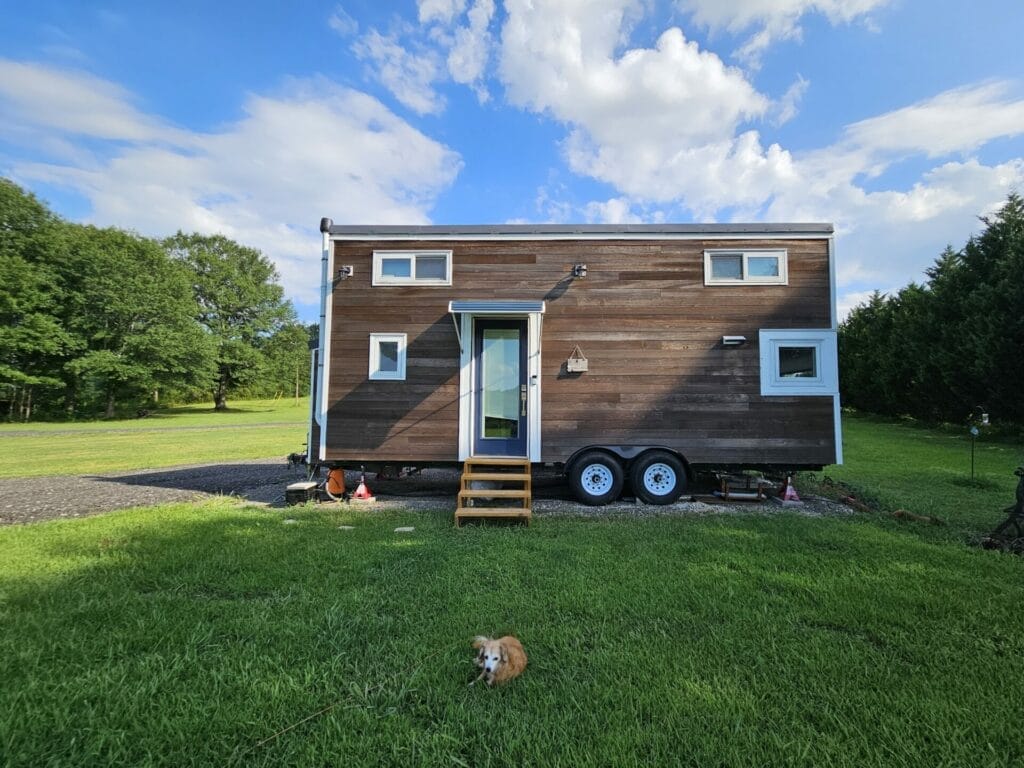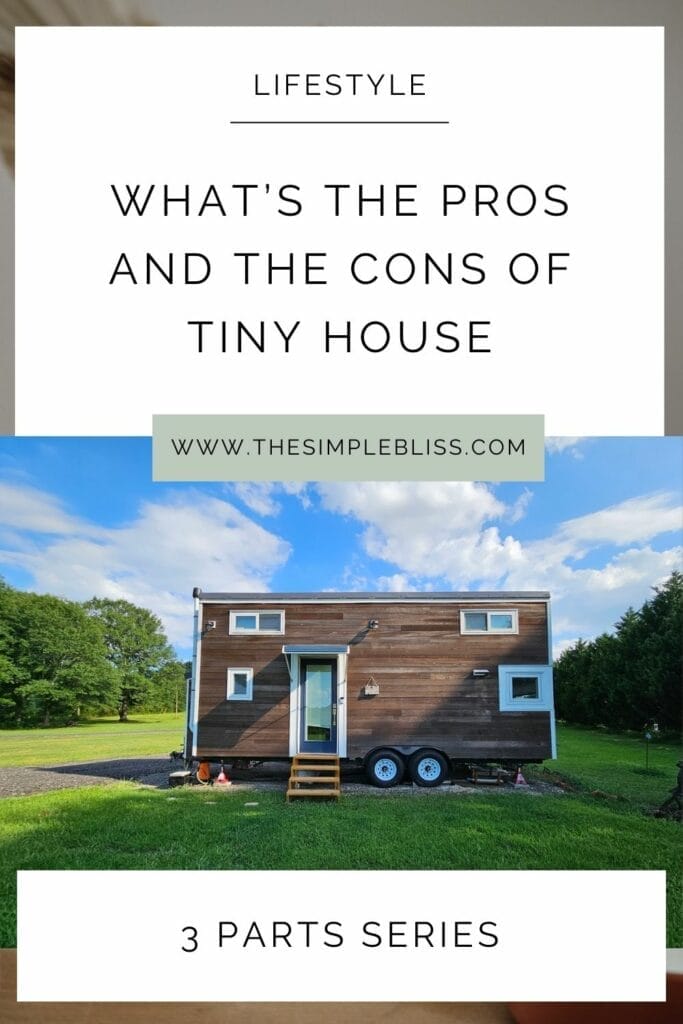We often meet fascinating and kind people during our travels, and this article is brought to you by one such individual. We met our special guest author, Didily, on a hiking trail, where our connection led to a warm invitation to her tiny house community. In this series, Didily shares her valuable insights on the pros and cons of tiny house living, offering a unique perspective from her own experiences.
Guest Post by Didily: Insights on Tiny House Living
So, in our early 20s, my partner and I were scouring social media and listing sites for tiny homes.
We had been living life on the road and in suitcases for a couple of years after finishing college, and we were ready to put down some roots.
Though we wanted a place of our own to live together, our options looked like this:
- Rent a (most likely shabby) apartment for $1500+, or
- The lifetime of debt necessary to secure a house of our own with a mortgage
Thus, the search for a tiny house began.
Save and Share this article about tiny house
We were lucky, and after about a year of searching, we found a cute tiny on Facebook that we were determined to make ours.

This was a year ago, and we’ve learned a lot since then.
In celebration of this year, I’ve summarized some of our experiences into a list of pros and cons.
This is the first article in a three part series. Hope this gives you more insight about the process of living in a tiny house.
Con #1: The Upfront Cost Barrier and the Hassle of Financing a Tiny House
I look back and laugh at it now, but I’d be lying if I said there weren’t buckets of frustration when it came to financing our tiny.
Typically, the easiest route to purchasing a tiny home is purchasing a new build or ordering one to be custom-made by a company (typically a construction company) that builds tiny houses.
And because it isn’t easy to list a tiny house, or very often that tiny homes are even listed on mainstream, reputable listing services for homes (such as Zillow, etc), we had limited online options to finding a tiny home.
Amid several disappointing and failed attempts to contact sellers to view tiny houses on tiny house listing sites, we scoured social media to find what we were looking for.
This led us to a Facebook Marketplace listing for a beautiful and well-loved tiny in another state.
We contacted. We hit it off with the sellers. We made an offer. Which was accepted.
We got our assets in order, and were finally prepared to purchase our lovely abode –
When our bank slammed on the brakes.
Scams and Catfishing
“Yes, this is so-and-so from your bank. I’m just calling to confirm that you’re trying to buy a what now? From Facebook Marketplace? Ma’am, I don’t mean to sound rude, but have you heard of scammers? There’re a lot on the internet nowadays. We don’t want to lose your money.”
At first, I was only annoyed. I mean, I got it; people get scammed all the time. And the cost of a tiny house leaving an account overnight is nothing to blink at.
But then it got worse.
The internet-fueled suspicion of our purchase seemingly spread at our bank, because very soon after the first phone call, I received another in which the source of our loan came into question.
Then, questions about my spouse’s identity and our relationship came up, as she’d transferred funds from her bank to mine to consolidate for our purchase.
“Ma’am, I mean no disrespect, but is your relationship to your partner mostly online?”
“You have to consider that you could be being catfished – I mean, she could be a jewel smuggler for all you know, and purchasing this… house – that you found *insert cough* online could just be a step in a grand scheme to scam you for a whole lot of money. It’s your call, but… you’re taking a real big risk here.”
And it (thankfully) was our call.
And a risk.
And several more phone calls and a grumpy in-store visit later with the very kind people we were purchasing from, we bought the house.

All this to say, large purchases considered “alternative” can be very sticky to pull off.
And the drag that our bank created in suspicion of this purchase made for an anxiety-inducing delay.
The Financing Dilemma
Don’t get me wrong, I appreciate our bank’s concern, proactive checking in, and attention to our case.
However, making “non-traditional” purchases and setting up finances for an “alternative” lifestyle comes with minimal professional support.
Unlike new mortgage applicants buying a traditional house or apartment, financial institutions generally offer little guidance to those choosing this lifestyle.
Thus, most of our decision-making came as a result of a whole lot of trust in the advice of several strangers online who had rounded this rodeo themselves.
And luckily, with a lot of patience, this worked out for us.
Even this hassle was only possible because we had the privilege of upfront money—our entire savings and a personal loan. Many young adults can’t do this due to student loans, low-paying entry-level jobs, or little to no credit.
We were extremely fortunate to find our tiny online and second-hand for a price that we could afford as two low-earning recent graduates.
But I’d be remiss not to mention that in choosing an “alternative lifestyle” there are struggles to being taken seriously or helped financially if you are a woman or of a gender minority, a person of color, young, a long-distance or international couple, disabled, lack familial support or financial guidance, etc.
But to keep from scaring you off, let me reassure you with this pro:
Pro #1: There is a Thriving Community of Tiny House Dwellers Ready to Help
Since we persisted and got our tiny, we’ve had several questions about how to do this whole living-in-a-tiny-home thing.
And thankfully, each one I’ve had so far has already been asked by somebody else online.
The threads born of these questions usually come with reliable answers. Or at least enough information to make an informed decision about whatever I’m debating.
Not to toot my own horn, (PSYCH. TOOT.), but tiny house people rock. And I trust their wisdom about choosing a toilet and deciding where to put my home.

So how to transport my home? There’s an answer, I don’t have to do it myself!
They’re also knowledgeable about choosing tiny house insurance. And decent prices to pay for rent if you’re borrowing land.
In some cases, their wisdom extends to things like rights, and common discrimination to be aware of when looking for places to park your tiny.
I am listing below a few resources I used if you are ready to learn more.
Spreading the Tiny House Love
People who live in tiny houses tend to look out for each other, to make as few barriers as possible to owning reliable and affordable shelter.
No one should go without opportunities for lack of knowing that they exist and are viable.
And there are several more reasons why tiny house people are so helpful to one another:
So many of us tiny home dwellers have been helped by others and want to pay that kindness forward.

Many of us wish to see tiny living become even more accessible, not only because it’s surprisingly great, but also because larger numbers of tiny houses means (hopefully) more public recognition of tiny houses as homes.
This would result in more public accommodation (or at least fewer legal restrictions) for owning a tiny.
In many areas, despite tiny houses being cute and insured, tiny houses are strictly prohibited.
This affordable, exciting lifestyle is something we’d like more people to be able to enjoy and benefit from.
Got to Decorate Tiny House Efficiently!
And finally, I look to these people for decoration inspiration.
And finding creative storage solutions. And ideas for making our space and furniture multi-functional.
Seriously, there are endless tiny house designs and furniture/storage plans out there (many of them free!).

So to wrap up here with the 1st pro and con… have hope, be inspired, and check out my next article where I’ll outline another pro and con! 
Save and Share this article about tiny house
Most Commonly Asked Questions
1. What are the pros and cons of living in a tiny house?
Pros include a lower environmental footprint and a supportive community. Cons include high upfront costs and financing difficulties.
2. How do you determine if a tiny house is right for you?
Consider your lifestyle, financial situation, and willingness to live in a smaller space. Research the pros and cons, and connect with the tiny house community for insights.
3. How do you finance a tiny house?
Financing a tiny house can be tricky due to limited loan options. Some people use personal loans, savings, or RV loans to fund their tiny home purchase.
4. Are there communities or support networks for tiny house dwellers?
Yes, there is a thriving community of tiny house dwellers who offer support, advice, and resources for those living in or considering tiny house living. There’s a list below.
5. Are there any legal considerations for tiny house living?
Yes, zoning laws and building codes vary by location. It’s essential to research local regulations and ensure your tiny house complies with them.
6. What are some tips for efficiently decorating a tiny house?
Efficiently decorating a tiny house involves using multi-functional furniture, maximizing vertical space, and keeping the design simple to make the most of limited space.
Resources
Facebook Group: Tiny House Hosting
Facebook Group: The Black Tiny House Movement
Facebook Group: Tiny Houses/Land/Lots for Sale/Rent
Photo credits:




Leave a Reply